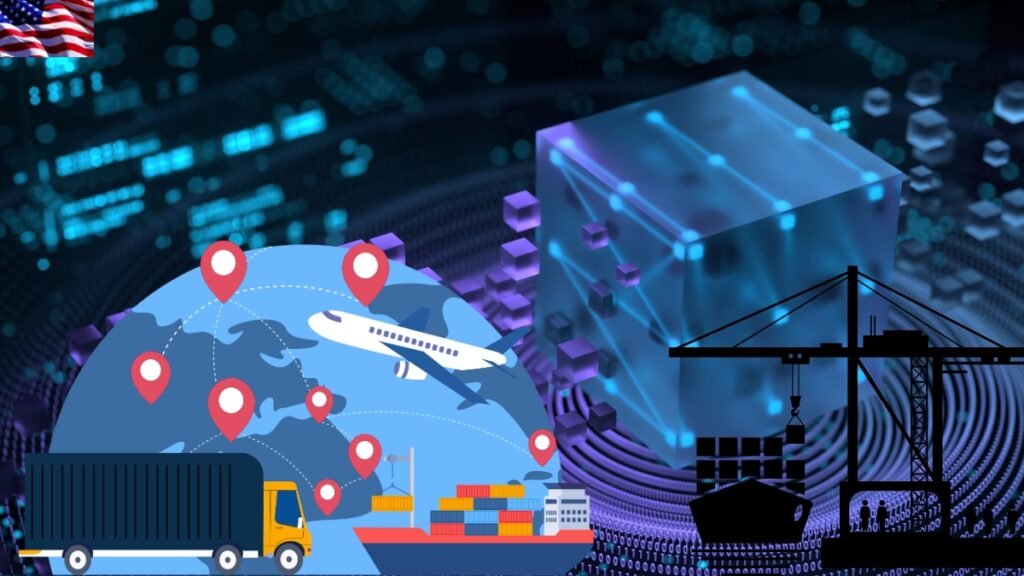In an era where global trade is increasingly complex, the shipping and logistics industry in the United States faces significant challenges, including inefficiencies, fraud, lack of transparency, and security vulnerabilities. Blockchain technology, originally developed as the foundation for cryptocurrencies like Bitcoin, offers transformative solutions to these issues. By decentralizing and securing data, blockchain can revolutionize how logistics operations are managed, monitored, and executed, providing unparalleled transparency and security.
Understanding Blockchain Technology
Blockchain is a decentralized, immutable ledger that records transactions across multiple systems. Its key features include:
- Decentralization: Data is not stored in a single location but distributed across a network of nodes.
- Transparency: All participants in the blockchain network can view transaction records, ensuring accountability.
- Immutability: Once data is recorded, it cannot be altered or deleted, preventing fraud.
- Smart Contracts: Automated, self-executing contracts streamline operations without the need for intermediaries.
In shipping and logistics, these attributes are particularly valuable as they address some of the industry’s most pressing challenges.
Enhancing Transparency in Logistics
Real-Time Tracking and Visibility
Traditional logistics systems rely heavily on fragmented tracking systems and manual record-keeping, often leading to discrepancies and delays. Blockchain allows for real-time tracking of shipments by integrating data from Internet of Things (IoT) devices, GPS, and RFID tags into a unified ledger.
- Example: When a shipment moves through various checkpoints—such as warehouses, ports, or distribution centers—the blockchain ledger automatically updates the location and status.
- Benefit: Stakeholders, including shippers, carriers, and customers, can access accurate, up-to-date information, reducing miscommunication and disputes.
Streamlining Documentation
Paper-based processes, such as bills of lading, invoices, and customs declarations, are prone to errors, fraud, and delays. Blockchain digitizes and stores these documents securely.
- Use Case: Maersk and IBM’s blockchain initiative, TradeLens, has demonstrated how digitized shipping documents enhance transparency and expedite processes across global supply chains.
- Outcome: Faster transactions, reduced paperwork, and greater confidence among stakeholders.
Strengthening Security in Logistics
Protecting Data Integrity
One of the most critical advantages of blockchain is its immutability. Fraudulent activities such as tampering with shipment details or falsifying invoices can be significantly curtailed.
- How It Works: Once data—such as the origin, destination, or contents of a shipment—is recorded on the blockchain, it cannot be altered without consensus from the network.
- Example: Food safety in cold-chain logistics can be ensured by recording temperature data on the blockchain. Any deviation from acceptable conditions is immediately flagged, and tampering is almost impossible.
Mitigating Cybersecurity Risks
Traditional logistics systems often rely on centralized databases, making them vulnerable to cyberattacks. Blockchain, being decentralized, reduces the risk of a single point of failure.
- Benefits:
- Enhanced protection against data breaches.
- Reduced risk of ransomware attacks targeting sensitive supply chain data.
Efficiency Gains Through Smart Contracts
Smart contracts on blockchain platforms automate agreements between parties. These contracts execute predefined actions when certain conditions are met, eliminating the need for intermediaries.
- Example in Logistics: A smart contract might automatically release payment to a carrier once a shipment is delivered and verified.
- Advantages:
- Reduced administrative costs.
- Faster settlement times.
- Minimized human errors.
Applications in the US Logistics Sector
Port Operations
Major US ports like Los Angeles and Long Beach are grappling with congestion and inefficiency. Blockchain can enhance coordination by providing a shared ledger for all stakeholders, including shipping lines, terminal operators, and trucking companies.
- Impact: Reduced wait times, improved cargo handling, and streamlined customs clearance.
Anti-Counterfeiting in High-Value Goods
For high-value shipments, such as pharmaceuticals or electronics, blockchain offers robust anti-counterfeiting measures. By recording every step of the supply chain, from manufacturing to delivery, stakeholders can verify product authenticity.
Last-Mile Delivery
In e-commerce logistics, last-mile delivery is often the most challenging and costly segment. Blockchain enables better route optimization, real-time proof of delivery, and dispute resolution.
Challenges to Adoption
While blockchain offers immense potential, its implementation in US shipping and logistics faces certain hurdles:
- High Initial Costs: Developing and deploying blockchain systems require significant investment in technology and training.
- Interoperability Issues: Integrating blockchain with existing logistics systems and ensuring compatibility across different stakeholders is challenging.
- Regulatory Uncertainty: As blockchain is a relatively new technology, regulations governing its use in logistics are still evolving.
The Future of Blockchain in US Logistics
Despite these challenges, the adoption of blockchain in US shipping and logistics is gaining momentum. Initiatives like TradeLens and Walmart’s blockchain-based food traceability system highlight the technology’s potential. Moreover, advancements in blockchain scalability and energy efficiency are expected to make it more accessible.
- Predicted Trends:
- Increased use of blockchain for end-to-end supply chain visibility.
- Integration with AI and IoT for predictive analytics and automation.
- Growth of blockchain consortia to drive standardization and collaboration.
Conclusion
Blockchain technology is poised to revolutionize the US shipping and logistics industry by addressing critical issues of transparency and security. From real-time tracking to fraud prevention and smart contracts, the benefits of blockchain extend across the supply chain. While challenges remain, ongoing innovations and collaborations are likely to overcome these barriers, paving the way for a more efficient, secure, and transparent logistics ecosystem.
Adopting blockchain is not just an upgrade—it’s a strategic imperative for logistics companies aiming to stay competitive in an increasingly digital and interconnected world. As the technology matures, its role in transforming US logistics will undoubtedly expand, making it a cornerstone of modern supply chain management. read more – https://brocredits.com/german-archaeologists-unearth-400-year-old-ship-in-baltic-dw-08_01_2023/

